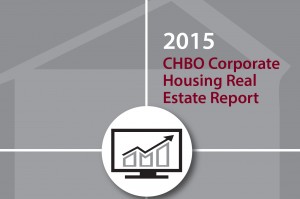Trends: Corporate Housing Real Estate Report.
 Admin
Admin
Published Date: 2016-02-23

After two decades in the corporate housing real estate sector, I’ve come to appreciate and respect the importance of watching trends and studyin g data. As you look for ways to be more successful with your rentals and capitalize on emerging trends, our 2015 Corporate Housing Real Estate Report can help. This report contains the results from our annual corporate housing real estate survey — now in its seventh year.
g data. As you look for ways to be more successful with your rentals and capitalize on emerging trends, our 2015 Corporate Housing Real Estate Report can help. This report contains the results from our annual corporate housing real estate survey — now in its seventh year.
Once again, we received hundreds of responses. I’d like to thank everyone who took the time to complete our survey. We appreciate your input! - Kimberly
The Need for Corporate Housing Real Estate
As you’ll see in the coming posts, there continues to be a strong need for professional corporate housing real estate rentals from independent property owners and managers like you. And personally, I believe the clients who need this type of lodging are very different from those who want a shared rental or an extended stay hotel.
Think about the difference between buying a new car from a dealership versus buying a used car from an individual. These are transactions for two types of customers with very different needs. Likewise, a relocating professional who has a high paying, high pressured job and needs to relocate his or her family of five to a new city is looking for corporate housing from a professional. That professional may be an experienced corporate housing business or a private owner who understands all the expectations of a business traveler as outlined in the Corporate Housing Providers Association and “The CHBO Corporate Housing Handbook.” You’re filling an essential need!
Where to Turn for More Information
We love helping people find new information and tools that can get their properties rented. I invite you to contact us to discuss the findings in this report or to learn about trends in your market. Our CHBO Property Specialists speak with independent owners and managers every day, and we welcome your call.
About This Report
 This report is different from other property management reports because it reflects input from independent owners and property managers, rather than full-service corporate housing companies.
This report is different from other property management reports because it reflects input from independent owners and property managers, rather than full-service corporate housing companies.- Our survey was open to anyone who owned or managed a furnished, monthly residential rental in 2015 – not just to CHBO users. Our goal is to get the best snapshot of the independent corporate housing segment, so you can learn from relevant trends and be more successful.
Executive Summary
Survey Respondents
- Property Locations. In 2015, hundreds of property owners and real estate managers from 32 states and the District of Columbia answered our survey questions. For the second year in a row, the highest response rates came from those in California, Colorado, Texas, Washington and Illinois.
- Number of Properties. More than eight out of 10 survey respondents have one to five rental units, and four out of 10 survey respondents have one property only. (The responses in this report truly reflect the independent corporate housing real estate segment.)
- Years as a Corporate Housing Landlord. As the real estate market stabilizes, new landlords are entering the market. 65% of respondents say they’ve been furnished landlords for four years or less. 28% have been landlords for one year or less — the highest percentage since 2011.
- Reasons for Being a Corporate Housing Real Estate Landlord. The majority of respondents — 58% — tell us they’re landlords for “investment purposes.” With a 15% response, the second most common reason for being a landlord is renting a “primary residence.”
- Corporate Housing Terminology. 81% of respondents list their rentals as “corporate housing.” This is an all-time high for use of this terminology. The second most popular term is “furnished rentals.”
Outlook and Profitability
- Outlook for 2016. The number of respondents who say the future looks “much better than last year” held strong at 21%, down just slightly from 23% in 2014. The number of respondents who say they are “not sure” about the future rose to 18% — up from the all-time low of 11% in 2014. This may be a result of the current election cycle.
- Profitability. For the fourth year in a row, more than nine out of 10 respondents report their properties are profitable or breakeven. More respondents say their properties are “very profitable,” up 2% over 2014. However, we also saw an increase in the number whose properties are “breakeven.”
- Investment Real Estate Trends. Consistent with previous years, more respondents say, “Yes, I plan on buying more real estate” (45%), than “No, I’m done with real estate” (18%). Unlike previous years, however, the number of respondents who say they’re done with real estate investing rose 5%.
Rental Rates
- Variance: Changes in Corporate Housing Real Estate Rental Rates. 39% of respondents — an all-time high — report charging higher or much higher rental rates in 2015. This number has been rising since 2013. We also saw a 3% decrease in the number of respondents who say their rental rates were identical to the previous year.
- Actual Rental Rates. Compared to our 2014 survey results, actual rental rates were higher in 2015. The one exception was for studio units, which showed a slight decrease in month-to-month rental rates. 4 bedroom rentals saw the largest increase in rental rates.
- Rental Discounts. While the majority of respondents (60%) say they offer a discount for longer-term leases, we saw an all-time high (40%) among those who don’t offer a discount. Among property owners who do offer discounts, their discounts are typically small. 68% offer a discount of 9% or less. Only 16% of respondents offer a discount of 15% or more.
Property Management Trends
- Management of a Property. At an all-time high, 92% of respondents say they do all their property management themselves. This number is up from the all-time low of 72% back in 2013. In 2015, the biggest increase in additional support was from “friends and family,” jumping to 8% (up from 1% in 2014).
- Property Management Software. The majority of property owners (55%) do not use any type of property management software. Property owners who say they use basic spreadsheets or accounting software (such as QuickBooks™) reached all-time lows at 19% and 14% respectively.
- Rental Documents. 37% of respondents say they wrote their own rental documents. 35% use documents from CHBO. 32% found their documents on the Internet.
- Leasing Trends. 50% of respondents say they meet their clients face to face before leasing their properties — up from 44% in 2014. This is a notable contrast with the full-service corporate housing industry, in which 70% of all leasing is done without a renter touring a specific property. In 2015, both email and phone communication increased with potential renters.
Properties
- Property Size / Number of Bedrooms. 42% of respondents say they offer rental properties that include three bedrooms or more. 17% say they offer rental properties with four bedrooms or more.
- Property Type. 36% of the properties accounted for in 2015 are condos and 36% are single-family homes (up from 26% in 2014). We continue to see great diversity in the types of properties offered through the independent corporate housing real estate segment.
- Property Locations. Consistent with previous years’ results, 49% of respondents say their corporate rental properties are located in urban, business districts. 44% say their properties are located in suburban areas.
- What’s Included in Your Corporate Housing Real Estate Rental? In 2015, we saw all-time highs in respondents who offer bed linens (92%), TV (92%), electricity (88%), BBQs (44%), community activity passes (18%), Netflix (16%) and Game Box (4%). We saw all-time lows in those who offer stereos (36%), phones (27%), I-Pod docks (13%) and transit passes (0%).
Tenants
- Experiences with Corporate Housing Real Estate Tenants. 88% of respondents say they had positive experiences with their corporate housing tenants in 2015. While slightly down from 2014, this percentage has generally been consistent from year to year.
- Renter Types. “Relocation” renters rose to 45% — up 3% over 2014. We also saw all-time highs in renters due to: “home remodels” (30%), “movies/entertainment” (15%) and “divorce” (20%). We’ve seen annual increases in renters due to divorce since 2010.
- Lengths of Stay. Six out of 10 respondents say their last tenant stayed for three months or longer. 15% say their last tenant stayed for one year or longer. At an all-time high in 2015, 78% of respondents say they would only rent their property for 30 days or more.
- Security Deposits, Travel Insurance and ARDI. 88% of respondents collect a refundable security deposit — most often, $500 to $1000 or one month’s rent. The number of respondents who collect “no kind of deposit” hit an all-time low of 4%. 26% of respondents say they offer travel insurance and/or Accidental Rental Damage Insurance (ARDI) to their renters.
- Credit & Background Checks. A year ago, when we asked property owners whether they run credit and background checks on potential clients, an all-time high answered: “yes.” The strong response continued in 2015. 34% of respondents told us, “Yes, they always run credit checks on potential tenants,” and 33% said, “Yes, they always run background checks.”
- Credit Cards. Approximately 57% of respondents say they accept some form of credit card payment from their renters, down slightly from last year. In 2015, MasterCard and Visa tied with PayPal as the most popular credit solutions.
Pets
- Pets Trends and Pet Fees. We saw a slight increase in the number of property owners who accept pets compared to 2014. 38% of survey respondents say they accept pets (down from the all-time high of 50% in 2011). The most common rental period for renters with pets is one to 30 days. The average, non-refundable, one-time pet fee that property owners charge is $251 (down from $262 in 2014). The average pet refundable deposit is $502 — an all-time high.
Marketing
- Marketing Trends. In 2015, property owners spent less on marketing, and they were less satisfied with their results. 63% of respondents say they spent $499 or less on their annual marketing efforts. 41% of respondents say their properties were always rented in 2015 (down from 48% in 2014). Nine out of 10 respondents say they prefer to pay flat rate marketing fees versus paying a percentage of the lease as their marketing fee. 80% say they have professional photos of their properties (up from 75% in 2014), and 35% say they have a dedicated website for their properties (down from 39% in 2014).
- Marketing Sources. Given that respondents invested less in marketing, it’s no surprise that more than half of the marketing sources that have been used in the past hit all-time lows. The three most used marketing sources included the CHBO basic listing (62%), Craiglist (40%) and Airbnb (36%). Facebook saw a 7% decline in usage. (In last year’s survey, many respondents said Facebook didn’t yield the right renters.)
- Marketing Results. Respondents say that CHBO was the source of the most qualified leads by a wide margin, followed by Craigslist, Airbnb and HomeAway. CHBO also was the source of the most renters, followed by Airbnb, HomeAway and Craigslist.
- Internet Reservations. Once again, we asked property owners about real-time booking reservations (in which a property is leased through a computer website without any interaction between the property owner and tenant). Similar to 2014, 44% of respondents say they’ve used one of these programs.
- CHBO Services. Of the respondents using CHBO, they tell us they use the following CHBO tools the most: (1) The property listings (2) The Corporate Housing Handbook for property owners (3) This annual Corporate Housing Report.




